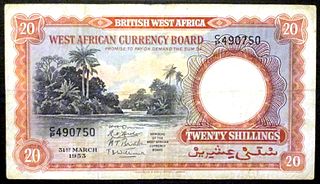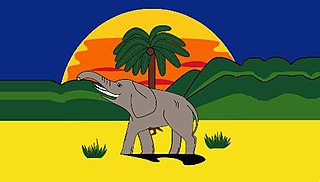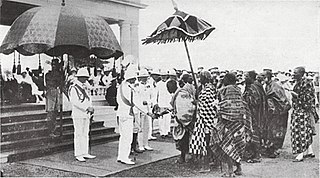Related Research Articles

In modern parlance, a colony is a territory subject to a form of foreign rule. Though dominated by the foreign colonizers, colonies remain separate from the administration of the original country of the colonizers, the metropolitan state. This administrative colonial separation makes colonies neither incorporated territories nor client states. Some colonies have been organized either as dependent territories that are not sufficiently self-governed, or as self-governed colonies controlled by colonial settlers.

The Cape Colony, also known as the Cape of Good Hope, was a British colony in present-day South Africa named after the Cape of Good Hope. It existed from 1795 to 1802, and again from 1806 to 1910, when it united with three other colonies to form the Union of South Africa.

The Gold Coast was a British Crown colony on the Gulf of Guinea in West Africa from 1821 until its independence in 1957 as Ghana. The term Gold Coast is also often used to describe all of the four separate jurisdictions that were under the administration of the Governor of the Gold Coast. These were the Gold Coast itself, Ashanti, the Northern Territories Protectorate and the British Togoland trust territory.

The Agadir Crisis, Agadir Incident, or Second Moroccan Crisis was a brief crisis sparked by the deployment of a substantial force of French troops in the interior of Morocco in April 1911 and the deployment of the German gunboat SMS Panther to Agadir, a Moroccan Atlantic port. Germany did not object to France's expansion but wanted territorial compensation for itself. Berlin threatened warfare, sent a gunboat, and stirred up German nationalists. Negotiations between Berlin and Paris resolved the crisis on 4 November 1911: France took over Morocco as a protectorate in exchange for territorial concessions to German Cameroon from the French Congo.
The human history of Western Australia commenced between 40,000 and 60,000 years ago with the arrival of Aboriginal Australians on the northwest coast. The first inhabitants expanded across the east and south of the continent.

The pound was the currency of British West Africa, a group of British colonies, protectorates and mandate territories. It was equal to one pound sterling and was similarly subdivided into 20 shillings, each of 12 pence.
A colonial empire is a collective of territories, either contiguous with the imperial center or located overseas, settled by the population of a certain state and governed by that state.
Sir Cornelius Alfred Moloney was a British colonial administrator.

The Gold Coast was the name for a region on the Gulf of Guinea in West Africa that was rich in gold, petroleum, sweet crude oil and natural gas. This former region is now known as the country Ghana.
The Anlo Youth Organisation was a political party that existed in the Gold Coast and later Ghana. It campaigned for the Ewe people under British rule to stay within Ghana after independence. It ended by merging with other parties to form a united opposition to the Convention People's Party.
Abor is a town in the Keta Municipal District of the Volta Region in southeast Ghana. Abor lies east of the Volta River and just north of the Keta Lagoon. Abor is known for Abor Senior High School, often referred to as ABORSCO. The school is a second cycle institution.
Anloga is a town in Keta District of the Volta Region in southeast Ghana. It lies east of the Volta River and just south of the Keta Lagoon. Anloga is the forty-seventh most populous town in Ghana, in terms of population, with a population of 35,933 people.

Sir Walter Egerton, had a long career in the administration of the British Empire, holding senior positions which included the Governorships of Lagos Colony (1904–1906), Southern Nigeria (1906–1912), and British Guiana (1912–1917).

Agbozume or Klikor-Agbozume is a town in Ketu Municipal District in the Volta Region of southeastern Ghana. The main language spoken is the Ewe language.

The Kamerun campaign took place in the German colony of Kamerun in the African theatre of the First World War when the British, French and Belgians invaded the German colony from August 1914 to March 1916. Most of the campaign took place in Kamerun but skirmishes also broke out in British Nigeria. By the Spring of 1916, following Allied victories, the majority of German troops and the civil administration fled to the neighbouring neutral colony of Spanish Guinea. The campaign ended in a defeat for Germany and the partition of its former colony between France and Britain.

Togbi Sri II (1852–1956) was the Awoamefia (ruler) of the Anlo people of South East Ghana from 1906 to 1956.
John van der Puije was a Gold Coast merchant, newspaper publisher, traditional ruler and politician. Between 1894 and 1904, he was appointed a member of the Legislative Council. He was also instrumental in the re-introduction of the Anglican Communion and English Freemasonry to the colony. He also lobbied the British colonial government to have greater African representation in the civil service in the late nineteenth century.
References
- ↑ Gakleazi, Ameamu. "Rejoinder: Who rules Anlo in the interim" . Retrieved 2 May 2014.
- ↑ Nukunya, G.K. (1999). Kinship and Marriage Among the Anlo Ewe. London: Athlone Press. ISBN 9780485196375.
- ↑ Clifford, Elizabeth (1919). Our Days on the Gold Coast. London: John Murray.